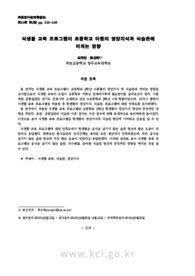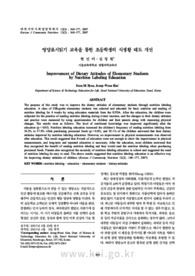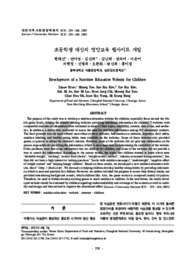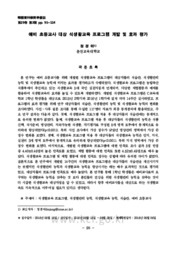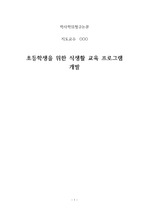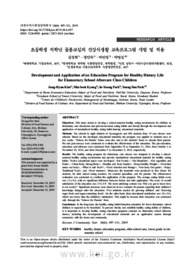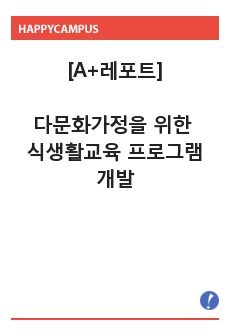

PARTNER
검증된 파트너 제휴사 자료
초등학생의 영양교육을 위한 식습관 및 영양지식 조사
방대한 850만건의 자료 중 주제별로 만들수 있는 최적의 산출물을 해피 캠퍼스에서 체험 하세요 전문가의 지식과 인사이트를 활용하여 쉽고 폭넓게 이해하고 적용할수 있는 기회를 놓치지 마세요
13 페이지
최초등록일 2016.04.02
최종저작일
2000.07
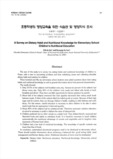
-
 * 본 문서는 배포용으로 복사 및 편집이 불가합니다.
* 본 문서는 배포용으로 복사 및 편집이 불가합니다.
미리보기
서지정보
· 발행기관 : 한국식생활문화학회
· 수록지 정보 : 韓國食生活文化學會誌 / 15권 / 3호
· 저자명 : 구복자, 이경애
영어초록
The aim of this study is to survey the eating habits and nutritional knowledge of children in Pusan, with a view to uncovering problems and their underlying causes and cultivating desirable dietary habit and nutrition for children. Three hundred and fifty six elementary school students were asked questions about their eating habits and nutritional knowledge as well as general information about their personal characteristics. The results showed: 1. Only 53.5% of the subjects had breakfast every day. Seventy-six percent of the subjects had dinner every day. Only 40% of the children took meals and talked with family at both breakfast and dinner. Thus there was little opportunity for dietary guidance by parents. 2. About half of the subjects answered that their appetite decreased after eating snack foods between meals. A third of the subjects liked the baked goods as snacks. Because of their high sugar and fat content, they can damage children's health, resulting in child diabetes and tooth decay. For this reason, careful education is necessary to allow children to be able to select snack foods that are appropriate in kind and quantity. 3. About 85% of the subjects had an unbalanced diet. Therefore systematic nutrition education at school is necessary to instill in children the value of balanced diet. 4. Children preferred rice to other cereals as a staple food. They disliked kimchi, seasoned and blanched foods and salads as subsidiary foods. It is therefore necessary to teach children systematically the nutritional advantage of cereals and vegetables and to heighten their awareness of Korean food culture. 5. Children had a low level of nutritional knowledge. The knowledge of specific nutrients was lower than that of foods. In conclusion, systematical educational programs need to be developed at elementary school. These should include information about achieving a balanced diet, good eating habit, meal management and Korean dietary culture. Nutritional education at home must be emphasized.참고자료
· 없음태그
-
자료후기
Ai 리뷰지식판매자의 자료는 질이 높고, 각 분야의 전문 지식을 바탕으로 한 콘텐츠가 많아 학습하는 재미가 쏠쏠합니다. 앞으로도 많은 유익한 자료를 기대합니다! -
자주묻는질문의 답변을 확인해 주세요

꼭 알아주세요
-
본 학술논문은 (주)코리아스칼라와 각 학회간에 저작권계약이 체결된 것으로 AgentSoft가 제공 하고 있습니다.
본 저작물을 불법적으로 이용시는 법적인 제재가 가해질 수 있습니다. -
해피캠퍼스는 구매자와 판매자 모두가 만족하는 서비스가 되도록 노력하고 있으며, 아래의 4가지 자료환불 조건을 꼭 확인해주시기 바랍니다.
파일오류 중복자료 저작권 없음 설명과 실제 내용 불일치 파일의 다운로드가 제대로 되지 않거나 파일형식에 맞는 프로그램으로 정상 작동하지 않는 경우 다른 자료와 70% 이상 내용이 일치하는 경우 (중복임을 확인할 수 있는 근거 필요함) 인터넷의 다른 사이트, 연구기관, 학교, 서적 등의 자료를 도용한 경우 자료의 설명과 실제 자료의 내용이 일치하지 않는 경우
찾으시던 자료가 아닌가요?
지금 보는 자료와 연관되어 있어요!
문서 초안을 생성해주는 EasyAI


